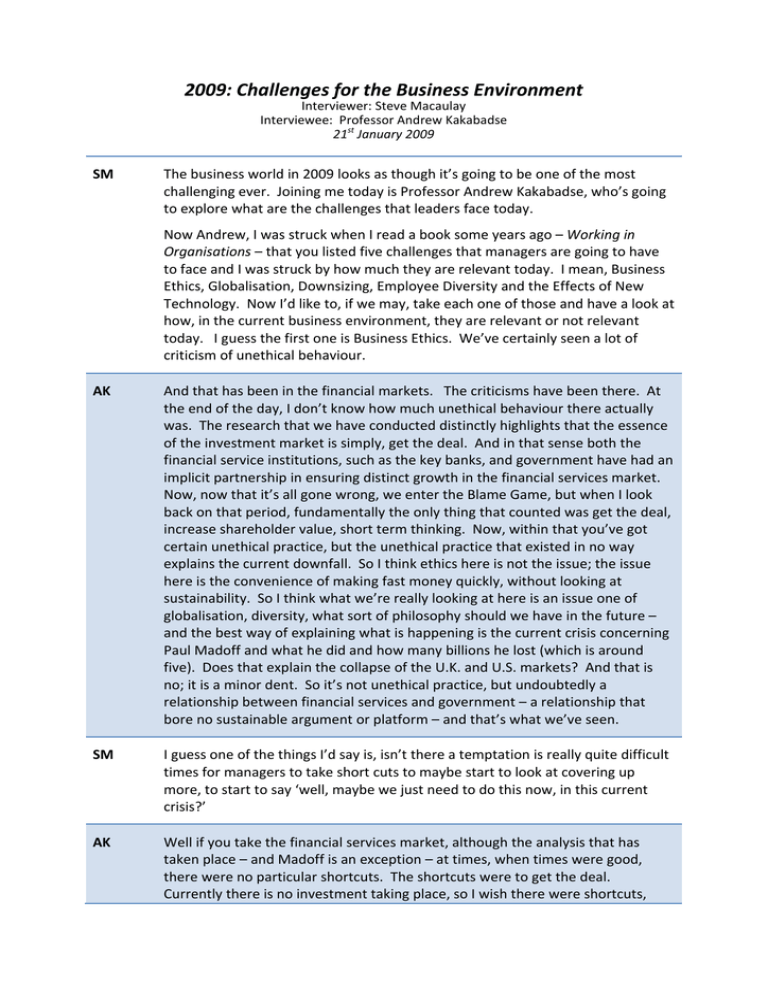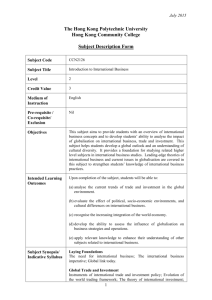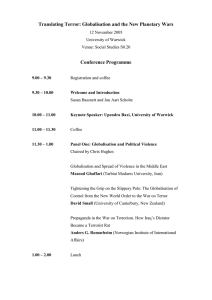2009: Challenges for the Business Environment
advertisement

2009: Challenges for the Business Environment Interviewer: Steve Macaulay Interviewee: Professor Andrew Kakabadse 21st January 2009 SM The business world in 2009 looks as though it’s going to be one of the most challenging ever. Joining me today is Professor Andrew Kakabadse, who’s going to explore what are the challenges that leaders face today. Now Andrew, I was struck when I read a book some years ago – Working in Organisations – that you listed five challenges that managers are going to have to face and I was struck by how much they are relevant today. I mean, Business Ethics, Globalisation, Downsizing, Employee Diversity and the Effects of New Technology. Now I’d like to, if we may, take each one of those and have a look at how, in the current business environment, they are relevant or not relevant today. I guess the first one is Business Ethics. We’ve certainly seen a lot of criticism of unethical behaviour. AK And that has been in the financial markets. The criticisms have been there. At the end of the day, I don’t know how much unethical behaviour there actually was. The research that we have conducted distinctly highlights that the essence of the investment market is simply, get the deal. And in that sense both the financial service institutions, such as the key banks, and government have had an implicit partnership in ensuring distinct growth in the financial services market. Now, now that it’s all gone wrong, we enter the Blame Game, but when I look back on that period, fundamentally the only thing that counted was get the deal, increase shareholder value, short term thinking. Now, within that you’ve got certain unethical practice, but the unethical practice that existed in no way explains the current downfall. So I think ethics here is not the issue; the issue here is the convenience of making fast money quickly, without looking at sustainability. So I think what we’re really looking at here is an issue one of globalisation, diversity, what sort of philosophy should we have in the future – and the best way of explaining what is happening is the current crisis concerning Paul Madoff and what he did and how many billions he lost (which is around five). Does that explain the collapse of the U.K. and U.S. markets? And that is no; it is a minor dent. So it’s not unethical practice, but undoubtedly a relationship between financial services and government – a relationship that bore no sustainable argument or platform – and that’s what we’ve seen. SM I guess one of the things I’d say is, isn’t there a temptation is really quite difficult times for managers to take short cuts to maybe start to look at covering up more, to start to say ‘well, maybe we just need to do this now, in this current crisis?’ AK Well if you take the financial services market, although the analysis that has taken place – and Madoff is an exception – at times, when times were good, there were no particular shortcuts. The shortcuts were to get the deal. Currently there is no investment taking place, so I wish there were shortcuts, because actually we would have a greater fluidity in the market. So yes, the answer is in theory that is the case, but how many cases have we seen of unethical practice coming to the surface that really is exceptionally different to any other time? And at the moment, I don’t see it, but what I do see is a business strategy that was opportunistic and a policy design of the nation state that really was unthinking and simply trying to make short term money at the expense of everything else. And, to be honest with you, did many people see that? Yes. How many times at Christmas did you see on T.V. programmes the fact that the ordinary citizen was spending so much money on their credit cards that this whole bubble is going to collapse? That must have been a regular story for the past four or five years, to the point where it got a joke. So we’re seeing nothing new and we’re not seeing anymore unethical practice than at any other time. What we are seeing is policy failure. SM Now let’s have a look at Globalisation. I mean, we’ve certainly all started to experience that, about how things that happen in America affect us directly, about how China takes a downturn and that affects us in all sorts of ways. Petrol starts to go up in price, petrol starts to come down in price; all of which we don’t seem to have much control of. What are the implications for the average manager? I’m not talking here about the people that are talking to governments; I’m talking about the people that are managing an average sized company, for example. AK That’s a very good question. And probably the answer is going to be ‘as best control your costs’. You’re quite right that current trends and globalisation – even senior managers in organisations – have absolutely no control. What you tend to have is a relationship between the major corporates, the lobby groups and government forming alliances almost as transnational elites determining policy. And so I think with the current level of globalisation, we’re going to see two reactions. The first is; the only thing you can do is control your costs and so we’re going to get a greater mania on cost management than ever before, which is going to make people’s lives even harder than before. The other is going to be a questioning of globalisation and what that means. And in fact, that questioning is nothing new because really the very first globalisation empire – most people think it was the Roman, it wasn’t, it was the Spanish – they went from Japan to the United States (as we know it today) and we’re currently in the period of the American globalisation empire, or liberal economics. And I think that what’s going to happen across the world on an international basis is people are going to start questioning that, and questioning that seriously. Why should we be pursuing shareholder value when the net result of all this is going to be a greater wealth divide than ever before in markets that are essentially not growing. I just came across some very interesting statistics that in 2008, the growth of tangible products and services across the world was actually only about 49 billion. The position taken on derivatives markets and financial engineering was about 590 billion. That gives you the gap, basically, which was called speculative gambling. Now, if your growth in your economies is fundamentally based on trying to sell paper and giving people the image that this paper is worth more as time goes on and all of a sudden that bubble bursts, what do you think people are going to do? They’re going to say ‘we don’t want this anymore’. So I’m expecting a sharp reaction in China, I am distinctly expecting a sharp reaction in Europe, which fundamentally says ‘no more of this’, and it’s going to have political repercussions. And those political repercussions are ‘we don’t want these missiles in Europe, we probably don’t want NATO, we probably want a unified Europe as one country with its own currency and its own military’, so over time – under these current circumstances – I think there will be a political reaction for the region becoming the Nation State. And those regions will not necessarily agree with each other, so you probably will have – if that continues – two forms of globalisation. One will be the rationalist economic, liberal type market. The other will be cosmopolitanism, which is; everything is based on the citizen, everything’s based on the customer. You probably will have to have two houses of parliament, but unlike the United States, the Senate won’t be the most important, it’ll be the Chamber of the Citizens which will be the lower house. And so you will get, I think sitting side by side, shareholder value thinking with stakeholder value thinking. What’s unpredictable is where that will lead us. So I think there’s going to be two fundamental reactions; the first is at the policy level of the nation state, and the second is at the senior, middle management level of just the ordinary executive. And they will probably feel as powerless as ever, with costs as their only viable option to control. SM Now, can I have a look at this issue of costs, because one of the areas that undoubtedly is top of people’s agenda is costs mean downsizing. How does a leader best manage this whole issue of managing costs and downsizing? I mean, it’s got tremendous implications for the lives of ordinary people, it’s got tremendous implications when you start to say ‘well, I’ll cut a swathe through this organisation… 300 people have got to come out’ and so on. AK I think what’s going to happen there is really the problems of the past in better times which were not addressed are simply going to come to the surface. But the downsizing costs and outsourcing, which are basically the same package of techniques used to reposition the enterprise, those techniques are not going to alter. So if downsizing is a part of sourcing, we’re going to source this activity or facility out, or source it back in. You will still have the same three questions; ‘what’s core?’, ‘what’s critical?’ and ‘what’s nice to have?’ And if you can prove that something is core and critical, it will be kept in and possibly trimmed in terms of cost on a transactional basis. If it’s nice to have, but core but not critical, you’ll probably place it somewhere else or sell it. So you could be a pharmaceutical company, heavily dependent on R&D, but your business model has switched from Research & Development to Marketing & Brand Image, so all of a sudden R&D becomes core but it’s not critical and it certainly is nice to have under better times. So you could get oddities of behaviour, or behaviour that people would see odd from outside – because they don’t know that corporation – undertaking actions and making decisions which would seem to undermine the very essence of that corporation. I suspect under these difficult times that will not be the case and I suspect under these difficult times we will probably see a level of leadership quality and capability better than we have before, simply because there is no choice other than to pull together more, make clearer decisions, make them more rationalist and reduce the politics in the organisation. But it will be uncomfortable. SM So in a way, this discomfort is actually going to do us some good really? AK It is going to do us some good. The question that we all face really is once you have gone through those processes, which is more or less what any manager – middle or senior – can do, how much more debt is in the system that is going to affect the ordinary individual or the corporation and over which you have no control. And I think that is our critical question, so although the business techniques that we face are probably going to be used better now than ever before, not really knowing the level of debt and government not being quite honest with the level of debt, we have another unpredictable reaction which is what’s going to be happening at policy level, which is very much at the stratosphere level, which could affect us all. SM Now, HR issues, like Diversity, some would argue that was fine in the good times; when the chips are down, that’s got to be put on the back‐burner. What are your views on that? AK It’s the exact opposite. Diversity issues during the good times are really a conversation, but nothing more. Yes, it is fine, but why change… we’ve got money… it’s worked in the past… we’ve got one or two problems… why create upheaval? It’s also worth noting that diversity here is a broad concept and up to now has more been translated as gender diversity and I think that concept is now falling into distinct disrepute because there is an amazing amount of evidence emerging that fundamentally once in position, there is no difference in performance between males and females, females are no softer than males, or even vice versa, no brighter or less bright than males. The question is, are we getting the right people into the right roles and are we developing them. So, under times of stringency and strain, it is highly likely that the diversity issue and the talent issue are going to become the number one items on everyone’s agenda. Why aren’t we recruiting local talent in Indonesia or in Malaysia and instead bringing in expatriates, which are much more expensive, and we need to deal with that right now. Why aren’t we bringing the level of capability onto our Boards that has a regional representation, that has a regional understanding, that can buy into various networks, so that we can understand what is happening from China to South America, instead of having an all‐white board, male or female? So I suspect the diversity issue is going to be, with the talent issue, the number one HR issue which will be discussed not only in the top team, but also in the Boardroom. SM Interesting. One of the things over the last few years that’s really taken off is new technology; Web2, blogging, websites and so on. Every company seems to have been affected by this. Do you think the downturn will push that forward, put it back? AK I don’t think it’ll put it back. I think it will push it forward, but still the critical question will be; technology is a transactional medium of exchange, what from this technology can we use that will both have a cost implication and also will add to our competitive advantage? So the debate around technology will be the debate around strategy, as it will be the debate around downsizing or outsourcing, as it will be around diversity. So what you have here are, if you like, options. Corporate options. Corporate levers that will assist the organisation to be that much more competitive and gain that much better in‐road into their various markets. Now, the interesting thing is, what part of technology will we use and the answer is, I don’t know. But certainly if you do require to save your costs, why do we have so many executives travelling? Why can’t we use some of the interesting technologies that now exist for video conferencing whereby you can sit in a room and feel that your colleague 10,000 miles away is sitting right next to you? So I see the whole bit about communication and making contact with each other; that part of technology will increase. I can also see the technologies that enable outsourcing, they will increase. Some of the other technologies are actually recreational and I can’t see how a corporation will use them. What they will mean in terms of sales to the ordinary citizen? Again, I cannot predict that. SM So Andrew, in summary, 2009 – problem or opportunity? AK It’s going to be both. It’s going to feel like a problem. In reality it’s going to be more opportunity. It will unfortunately become problematic if the current circumstances we face continue into 2010 and possibly 2011. But it is an opportunity to deal with the cost, lack of competitive advantage questions, HRM issues that were never sorted out, portfolio issues (if you are a corporation) – why do we have this company? Why did Royal Bank of Scotland purchase ABN Amro at the level of debt that ABN Amro had? It will be an opportunity to deal with those, but once you have dealt with those, if there is still no upturn in the market and you have undertaken every possible organisational lever to better position your corporation and you still don’t get fluidity in the market, then unfortunately it does become problematic. SM Andrew, thank you. AK Thank you.


